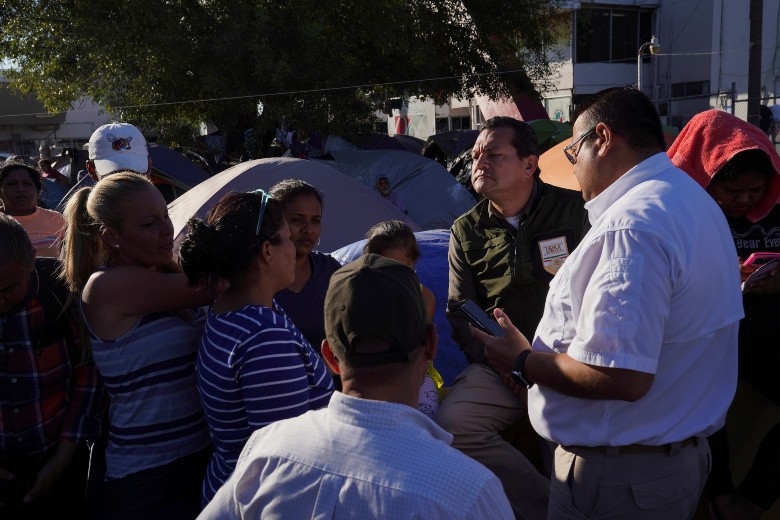Numbers of Brazilians Who Arrive in US-Mexico Border Surges

Mexican immigration officials talk to asylum seekers that live near the Gateway International Bridge in Matamoros
Migrants who want to stay in the United States are increasing despite the restrictive policy of Trump's administration in their new measures of immigration policy.
The previous reports of Latin Post, earlier this month reported about the increasing number of American asylum seekers due to violence they experienced in their homeland. Thousands even chose to stay in the border cities and living in a tarp. The worst, they have to endure the fluctuating temperature of the place that led to the death of some children due to Influenza and flu.
In a report from Latino Rebels, hundreds of Brazilians who cross from Ciudad Juarez in Mexico stayed in a Motel near the airport. This is part of the stepping stone of the Portuguese speakers in their journey to the United States.
The migration of 17,000 Brazilians in a single city in the U.S. in 2018 has become the new frontier of Trump's administration of stopping the illegal migration. Brazilians have been crossing the border like the hundreds of families collectively known coming from the Northern Triangle.
According to the U.S. Customs and Border Protection that they have apprehended 95 percent of the Brazilians who crossed in the El Paso Sector. A 600 percent increase or 18,000 Brazilians were apprehended in October nationwide.
U.S. Customs and Border Protection chief Mark Morgan said on Monday that he will try to shut down asylum seekers coming from the non-Spanish speaking countries. He said: "We're seeing, again, individuals from extraterritorial countries, extra-continental, come in from Brazil, Haiti, Africans."
He also added that he pledged to bar migrants from countries with the same level of commitment to address the issue of the Northern Triangles.
It can be remembered that one of the issues raised in the past week was the system called metering where asylum applicants were forced to stay in the borders of Mexico while waiting for the approval of their application. This system was even described as dangerous because a person was forced to live in a place where many wanted to escape due to violence.
However, Brazilian families are not held in a detention center but rather they are released in an Annunciation House where they can stay for a couple of days while arranging their flights to other cities in the U.S. Oftentimes, they are taken by a minivan by Phil Porter.
Porter, 72 years old, said that he has ferried around 200 Brazilians and he added that, "It takes a lot for somebody to pack up and leave their country, especially when they're family-oriented and these are economic refugees."
One of the reasons why the number of Brazilians who arrive in the U.S.-Mexico border is increasing is due to the economic problem they experienced most especially those who were affected in the 2015 and 2016 recession where their economy has roughly grow only in 1 percent. This somehow led to unemployment of 11.6 percent and underemployment of 27 million people.
Based on the 2015 U.S. Census data that Massachusetts has seen a significant number of Brazilians in their community most especially in their public schools. The state has the largest number of Brazilians followed by Florida.
Helison Alvarenga, the recent immigrant of the state, said that when he arrived in Massachusetts he started working and earned three times more than what he earned in Brazil. He said: "Things are in pretty bad shape in Brazil right now. The only way to have a better life in Brazil is to go to college, but college is very expensive."
An immigration lawyer in Waltham, who came from Brazil to study in a Law school in Boston, said that Brazilians who petitioned for asylum in Brazil are those who are affected by unemployment, corruption, and violence. And women who applied for asylum due to domestic violence were less likely to win their cases because of the new rules imposed by the Trump administration.
An immigration lawyer in Orlando, Florida Francis Brink also said that Brazilians who are getting tourist and student visas have been more difficult due to the economic downturn.
Meanwhile, there are many Brazilians who pretend to be a parent or a minor by having an ID obtained in Brazil. This is now part of the investigation of the Homeland Security of what they called "Family Fraud."
Subscribe to Latin Post!
Sign up for our free newsletter for the Latest coverage!
© 2026 Latin Post. All rights reserved. Do not reproduce without permission.















